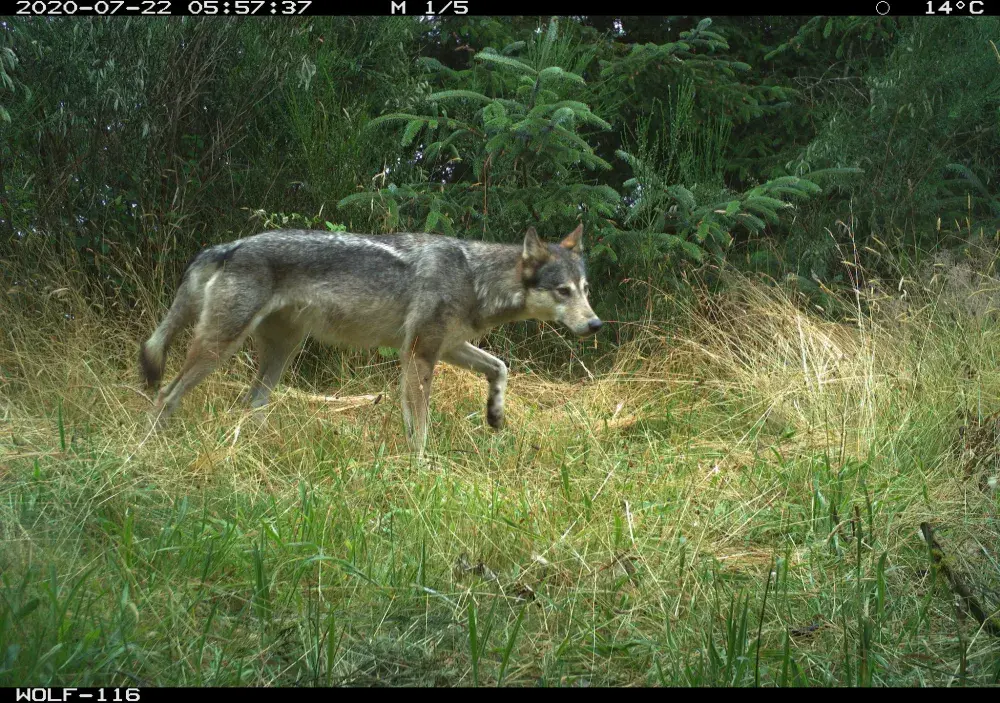Parks Canada is working closely with Yuułuʔiłʔatḥ Government and Tla-o-qui-aht First Nation to co-manage human interactions with a mated pair of habituated sea wolves in the Long Beach Unit of the Pacific Rim National Park Reserve (PRNPR).
PRNPR human-wildlife coexistence team lead Todd Windle says that, originally, the male was mated to another female but she was killed in January last year by a neighbouring family of wolves. Windle said the current female was observed roaming back and forth between the Broken Group Islands and north of the national park, looking for territory sometimes months at a time.
“Now (the female) has settled into here and it appears they have now established this area as their core area,” said Windle.
To date, Parks Canada has issued a ‘Wolves in Area Warning’, temporarily closed the Wickaninnish Dunes and former Gold Mine Trail to the public and announced a restricted activity order, which threatens up to $25,000 in fines to anyone who willfully approaches, views or engages within 100 metres of the wolves.
Yuułuʔiłʔatḥ-based wildlife photographer Sam Rose Phillips is working on a documentary about co-existing with wildlife. She has had to “actively set boundaries” with this pair of wolves this year and was relieved to see restrictions and closures put in place to protect them.
“Human behaviour has put this pair more and more at risk of habituation, and so it should be human behaviour that’s restricted. We are already familiar with restrictions around species like marine mammals, and I think that coastal wolves deserve the same level of respect,” said Phillips.
“The wolves shouldn’t be the ones to pay for our actions — whether that be walking with off-leash dogs, feeding wolves or photographing them during prolonged encounters. Without restrictions, some folks actively seek out encounters, further endangering wolves and those who live near them,” she continued.
Windle says there have been at least 40 reported wolf interactions (or encounters) in the Long Beach Unit this year and counting. In 2024, there were 18 interactions and in 2023 only seven recorded encounters.
“A sighting is not an encounter. An encounter is when there is some sort of two-way interaction, behaviour or change,” said Windle.
Keep kids close and leave dogs at home
For the time being, Parks Canada is asking people to keep kids close and to leave dogs at home when exploring the Long Beach Unit of the PRNPR, after a recent report of the male and female wolf preying on a large, leashed dog in broad daylight.
“(The dog owner) only noticed them when they were about six metres away. It was quite high tide, so there wasn’t a lot of beach, just all of sudden they were there,” said Windle.
“Wolves can be like that,” Windle continued. “In previous incidents where I’ve seen them prey on dogs, they’ll sometimes lie down and just wait for them to get close. They know they are coming and they’ll just lie down behind some of the grass and wait until they are within range.”
He said the dog owner was kicking at the wolves and using her leash to whip at them.
“The poop bags at the end of the leash kind of made a whizzing sound in the air that kind of deter them a little bit. They were very focused on the dog. They were very focused on eating it. (The dog owner) even lunged to scare them off and that didn’t have any effect at all,” he said, adding that it took the dog owner about 15 to 20 minutes to make it back to the parking lot at Wickaninnish Beach before the wolves broke off.
“The wolves are quite habituated and starting to test out dogs out as an easy prey food source,” said Windle.
The pair of wolves are also demonstrating “escort behaviour”, according to Windle, after they walked curiously toward a beachcomber in the middle of the day.
“Escort behaviour is essentially where they walk somebody away from an area they don’t want them. What makes this one a little more intense is that these wolves are also habituated. One of them highly habituated,” said Windle.
The west coast is the territory of the qʷayac̓iik (pronounced qwa-ya-tseek), which means wolf in Nuu-chah-nulth language.
“It’s a complicated situation and there is not a single solution that just fixes everything when it comes to coexistence with wolves,” said Windle.
“Everybody has a role to play in this. All the interactions add up over time. They are living here, they are hunting here. We really need to remind ourselves of that at times. It’s also about respecting the wishes of the nations who hold the qʷayac̓iik with the utmost respect,” he said.
Parks Canada is recommending that visitors to the PRNPR hike in groups, carry bear spray and an air horn.
If you see or encounter a wolf in the Pacific Rim National Park Reserve, Windle says to communicate with them in a clear way by yelling, clapping, honking horns and backing away slowly. Report encounters by calling Parks Canada dispatch at: 1-877-852-3100.

